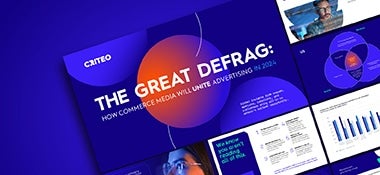Welcome to Criteo’s Digital Marketing News Roundup: Travel Edition. We’ve combed the latest travel marketing news to find the stats, trends, and insights that can help you build a first-class 2019 marketing plan.
Travel Personas and How to Influence Them to Book
New research from the CMO Council is in and travelers are less likely to be influence by social media and more by their own beliefs, values and interests when deciding where, how and why people travel. While deals, specials and promotions help drive desire and action, visually enhanced and personalized digital content are making travel experiences more enticing. Offering travelers personalized deals and promotions, according to the research, is the best way to get travelers more engaged in their interested destinations and get them to book.
Travel and Hospitality Marketing Budgets for 2019: 4 Trends to Watch
Read one pundit’s predictions for details on where marketing dollars will be spent next year. Michael Del Gigante, President and Creative Director at MDG Advertising predicts that search is now a “digital workhorse” and especially effective for travel and hospitality advertising, considering this year, search engines overtook social media as the top traffic referrer to content sites. Next up is visual content, as nearly a quarter of trip planners watch videos before they book. Staying on top of Instagram marketing and offering last-minute deals for those impulse vacation bookers are the other two trends to watch.
TripAdvisor goes deeper into social with relaunch as a travel ‘hub’
In late September, TripAdvisor relaunched its website to look and feel more like a social network. The strategy follows a research TripAdvisor conducted, asking its users what was most important to them when planning a trip. 66% of respondents said reviews, 62% said recommendations from friends and family, and 45% looking at photos. Users have a profile and feed, can follow friends and brands, and use handy features like “trips” to save recommendations to a list. CEO and co-founder Stephen Kaufer said the website is “going from the world’s largest travel site to the most personalized and connected travel community ever.” A harbinger of things to come from other travel advertisers?
CrowdRiff Raises $9 Million for Visual Marketing: Travel Startup Funding This Week
Travel-focused startups like Crowdriff and Travel Appeal are winning more funding. Toronto-based Crowdriff helps travel and tourism marketers use the best visuals for their work just raised $9 million in Series A funding and Florence-based Travel Appeal, which uses artificial intelligence to collect and analyze online travel data to help tourism operators boost their online branding and reputation has raised $3.45 million in Series A funding. This indicates that companies that cater to both B2B and B2C sides of the travel and tourism industry have room to grow with innovative solutions for businesses and consumers alike.
STARTUP STAGE: KeyoCoin helps independent travel companies through universal rewards program
KeyoCoin is another addition to the blockchain technology that’s transforming the travel industry. According to PhocusWire, 80% of tour and local experience purchases are made offline, and the 20% that are booked online are done through OTAs that charge up to 30% commission. KeyoCoin aims to “radically restructure” the marketplace by redistributing the commission between the provider and traveler, “so both are better off.”
KeyoCoin is focused on helping independent travel businesses gain visibility by offering a gamified rewards program to customers – users can earn rewards by doing location-based travel challenges, booking tours, activities, experiences, and of course, accommodations via the KeyoPass app.
Growing Pains for Influencer Marketing Raise Questions for Travel Brands
Are influencers worth the expense for travel brands? Skift reports that the travel industry is the eighth biggest spender on influencer marketing worldwide, but some brands are having second thoughts on whether the practice is worth it. As travel brands have or are shelling out anywhere between thousands to millions of dollars to partner with influencers, the industry is reassessing the effectiveness and ROI of these partnerships.
Organizations like Tourism Australia are banning digital influencers for all government agencies, and Canada’s advertising body Ad Standards updating guidelines on how to disclose paid influencer content. Influencer advertising isn’t going anywhere, but how the relationships play out remains to be seen. For the time being, brands should be flexible and have multiple approaches to working with influencers.
New WeChat Update Penalizes Travel Brands Late to the Site
A new version of TenCent’s WeChat app includes a few new features such as the ability to record facial expressions and turn them into editable gifs. But the new update is bad news for those hoping to market to Chinese consumers on the app since using subscription accounts to get content in front of users’ eyes will be heavily curtailed. It’s especially bad for those new to the platform, who will have a much harder time standing out.
WeChat will soon feature a “Frequently Read” content row sticky to the top of the subscription account’s main page, to show the most popular content, while less popular accounts will be displayed with a headline and a small side image. The takeaway here is, marketers who aren’t on WeChat now should get on it soon.
Tapping the power of transformational travel
According to the Drum, 3 out of 4 millennials would rather buy an experience than a material good, and now the main purpose of travel has shifted to personal fulfillment rather than adding “exotic” wares to suitcases. The desire for fulfilling experiences and personalization is a truly global trend, with the Chinese market at the top end with 58% of high net worth travelers now using (and demanding) a travel advisor. Additionally, the article finds that 36% of travelers would pay more for their travel experiences if they felt like they were based on personal preferences.














